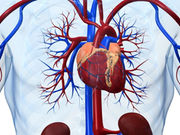But no increased acute or long-term cardiac mortality risk with guideline-recommended cardiac care
FRIDAY, Dec. 2, 2016 (HealthDay News) — Cancer survivors with ST-segment elevation myocardial infarction (STEMI) have increased acute in-hospital and long-term noncardiac mortality risk but no increased acute or long-term cardiac mortality risk with guideline-recommended cardiac care, according to a study published in the December issue of the Mayo Clinic Proceedings.
Researchers at the Mayo Clinic in Rochester, Minn., reviewed data on 2,346 patients with STEMI undergoing primary percutaneous coronary intervention. One in 10 had a history of cancer.
Cancer survivors did not have a higher risk of STEMI-related mortality; however, they were more than three times more likely to die of non-heart-related causes. After their STEMI, patients with a history of cancer were more likely to arrive at the hospital with cardiogenic shock. These patients were also more likely to receive intra-aortic balloon pump therapy. Cancer survivors were also more likely to be hospitalized for heart failure during follow-up. But those who received proper medical treatment were not at increased risk of dying from cardiovascular disease.
“This study supports the importance of cardiologists and oncologists working together to care for these patients,” senior author Joerg Herrmann, M.D., an interventional cardiologist at the clinic, said in a statement.
Full Text (subscription or payment may be required)
Copyright © 2016 HealthDay. All rights reserved.








